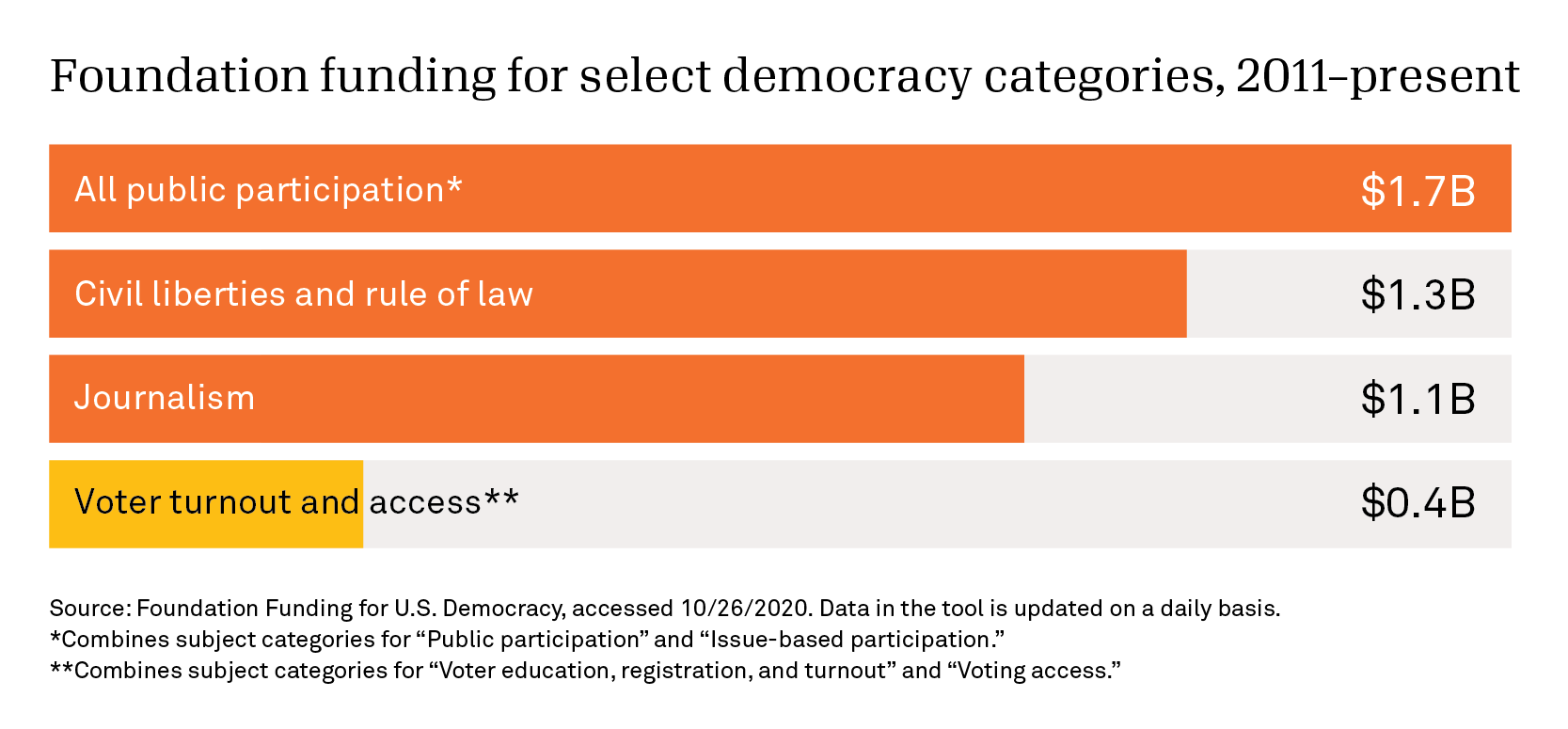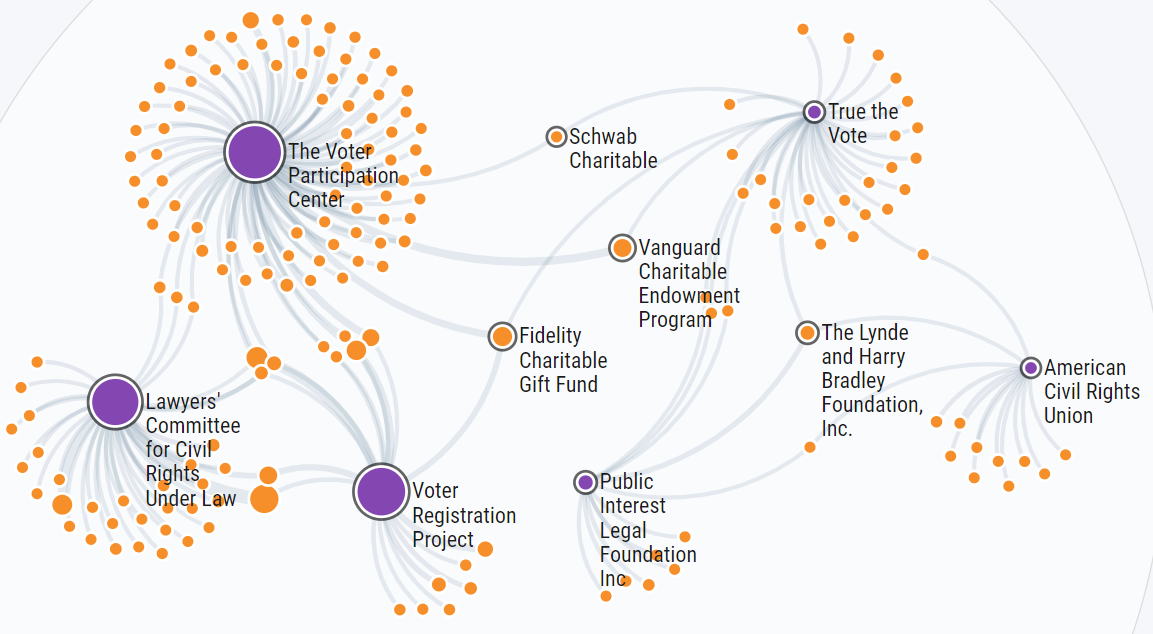Nonprofits, nonpartisanship, and voting

We often hear that nonprofits are nonpartisan, and it’s true that U.S. tax law prohibits public charities—which make up the bulk of the nonprofit sector in the United States—from supporting or opposing specific political candidates or parties. Of course, it doesn’t mean these organizations can’t have a position on issues.
Candid’s data on nonprofits and grantmaking shows nonprofit organizations are sometimes working from different ends of the political spectrum. Our president, Brad Smith, recently wrote about this dynamic at play among nonprofits that focus on the judiciary using data featured in Candid’s publicly available Foundation Funding for U.S. Democracy mapping tool. In the context of the current battle over the U.S. Supreme Court, he observes that some of the leading organizations in this space—Judicial Watch and the Federalist Society in one corner and the Brennan Center for Justice and Alliance for Justice in the other—have opposing views as to whether a successor to Ruth Bader Ginsburg should be named before the election. And that these two cohorts have just one funder in common—Hewlett Foundation, which has made grants to both the Federalist Society and the Brennan Center.
This political divide is not something that we flag in our data, though initially when then-Foundation Center developed the mapping tool, a few funders asked us to tag organizations appearing on the site as “liberal” or “conservative.” In some cases, this may seem like a reasonable label, one that plainly states the obvious. Generally though, it’s a tricky exercise. Most organizations can’t be categorized in this way. And what’s the criteria or metric for left or right leaning-ness? Ultimately, we did not apply these labels, but, as Brad’s post shows, one doesn’t have to dig too deep to reveal polarization within the nonprofit landscape.
This dynamic is at play—though more subtly—in the funding landscape for voting. The democracy mapping tool captures nearly 5,000 grants totaling $419 million awarded by U.S. foundations to nonprofits for voting work—including voter education, registration, and access—since 2011. It’s a relatively small area of democracy funding, dwarfed by foundation grantmaking for public participation, civil rights and rule of law, and journalism.

Most foundation funding for voting that we capture supports expanding it—by registering voters, especially those who have been underrepresented in the U.S. electorate, providing voter information and documenting problems that voters encounter, and by reducing barriers to voting through litigation. A few of the top nonprofits in terms of the number of grants they’re receiving for voting-related work are the Voter Participation Center, The Lawyer’s Committee for Civil Rights Under Law, and the Registration Project. Together, these three organizations have received 375 grants totaling $78.8 million from 129 funders since 2011.[i]
Organizations working on issues of voter fraud appear to receive overwhelmingly less in foundation grantmaking dollars. As a result, it’s more difficult to identify the prominent players in this space. GuideStar, Candid’s searchable database of 2 million+ U.S. nonprofits, is a useful resource here. Keyword searches for “voter fraud” and “election integrity” generate search results for True the Vote, the Public Interest Legal Foundation (PILF), and American Constitutional Rights Union (ACRU). As key nonprofits making the case that voter fraud is a threat to U.S. democracy, they work nationally to collect and document cases of election fraud, challenge the legitimacy of mail-in voting, and in the words of True the Vote, help build the movement to undermine the “radicalized leftist organizations … hard at work exploiting the weaknesses of our electoral process.” These three organizations here have received 173 grants from 50 funders totaling $3.9 million since 2011.[ii]
In the network map below (and also accessible in the democracy map,) these six organizations are represented as purple circles; their top funders appear as orange circles. The relative size of each circle indicates the amount of funding associated with each of these organizations. In addition to further illustrating the larger amount of funding going to organizations working on voting rights, the graphic also reveals that these two sides share no private foundation donors. The common links between them are limited to donor-advised fund platforms hosted by Fidelity, Vanguard, and Schwab.

A review of GuideStar profiles also shows that voter-fraud organizations tend to be much smaller in terms of annual revenue than nonprofits focused on registering voters and getting them to the polls. Again, using these six organizations as representative examples of competing nonprofit activity around voting, we see that the “Get out the vote” cohort is considerably larger based on 2018 revenue—the Voter Participation Center’s $26.3 million vs. True the Vote’s less than $500,000.
| Organization Name | Mission (excerpt) | Latest annual revenue | Focuses exclusively on voting? | GuideStar Seal holder level | ||||
|
|
||||||||
| Voter Participation Center | The key mission of the non-profit and non-partisan Voter Participation Center (VPC) is to bring more people into our democracy and ensure that those who are traditionally under-represented can fully participate in national, state, and local elections. | $26.3 million (2018) | Yes | None | ||||
|
|
||||||||
| Lawyer’s Committee for Civil Rights Under Law | We work inside and outside the courtroom for a just America, fighting voter suppression, ensuring equal access to the ballot box, combating the racial disparities that infect our criminal justice system, addressing economic inequality, advocating for fair housing, promoting equal educational opportunity, confronting the rise in hate crimes, and more. | $12 million (2018) | No | Platinum | ||||
|
|
||||||||
| The Voter Registration Project | The Voter Registration Project is part of [a] five-year campaign that began in 2016 with a goal of creating a more representative democracy by building and supporting large-scale, long-term nonpartisan voter registration in communities of color. | $24.1 million (2018) | Yes | Bronze | ||||
|
|
||||||||
| True the Vote | True the Vote is an IRS-designated 501(c)(3) voters’ rights organization, founded to inspire and equip volunteers for involvement at every stage of our electoral process. TTV empowers organizations and individuals across the nation to actively protect the rights of legitimate voters, regardless of their political party affiliation. | $436,046 (2018) | Yes | Gold | ||||
|
|
||||||||
| Public Interest Legal Foundation | The Foundation exists to provide services and representation to states and election officials, non-profit organizations, and individuals, to assist them with the exercise of their civil and constitutional rights, with particular focus on voting rights. PILF provides education to citizens and election officials regarding election integrity and the role of election process laws and how they affect policy and constitutional architecture. | $1.5 million (2018) | Predominantly though not exclusively | None | ||||
|
|
||||||||
| American Constitutional Rights Union | Engage in legal and educational activities for defending civil rights of Americans. | $1.3 million (2018) | No | None | ||||
What explains the difference in size between organizations working on different sides of the election protection question? It’s possible—but not something we can prove or disprove—that there are more liberal foundations than conservative ones and that the smaller size of voting fraud organizations is a result of this dynamic. Another possible explanation is related to strategic approach. Organizations working to expand the electorate focus on reaching as many people as possible, investing in grassroots outreach and large registration campaigns. Nonprofits working on voting fraud issues seem more focused on documentation, research, and targeted outreach and communications. Registering voters and engaging with them to increase turnout is an expensive ground game in the way that documentation and writing op-eds or appearing on television is not.
If you were to look purely at these respective organizations’ budget size, you might have the impression that the voting rights organizations dominated the national conversation and that Americans largely see the issue of voter repression as a bigger problem than voter fraud. Indeed, successive studies show that voter fraud is very rare and one analysis indicated the president’s (since disbanded) commission found no evidence to support claims of widespread fraud. In 2016, however, Americans were almost evenly divided as to whether repression or fraud constituted the bigger issue.
Inclusivity is a core principle of American democracy, and a core value at Candid—we incorporate equity, inclusion, and respect for diverse perspectives in all our work. Accordingly, we support the view that the effort to build the pool of active voters and ensure that their votes count is an important one. So, let us add our nonpartisan voice to the cacophony: please vote! And to the more than 50 million of you who already have, thank you!
Note: The first sentence of this post was updated in response to feedback from a reader. It originally stated, “We often hear that nonprofits are nonpartisan, and it’s true that U.S. tax law prohibits public charities—which make up the bulk of the nonprofit sector in the United States—from supporting or opposing specific political candidates, parties, and ballot measures.”
[i] Note that these totals are not limited to funding for voting access, but reflect all grantmaking awarded to the organization that meet criteria for inclusion in Foundation Funding for U.S. Democracy.
[ii] Again, these totals are not limited to funding for voting access, but reflect all grantmaking awarded to the organization that meet criteria for inclusion in Foundation Funding for U.S. Democracy.







timothy domini says:
The Brennan Center and Voting Rights have been in the same conversation for 25 years - seems like a big miss to not include them in this article
suzanne says:
Hi, Abby,
Thanks for your feedback. We just updated the first sentence and added a note about the correction to the end of the post.
Regards,
Suzanne Coffman
Editorial Director, Candid
Abby Levine says:
The opening sentence is too broad: 501(c)(3) public charities CAN support or oppose ballot measures. It is considered lobbying. We at Alliance for Justice's Bolder Advocacy program have a variety of resources on this topic, including Seize the Initiative: https://bolderadvocacy.org/resource/seize-the-initiative/